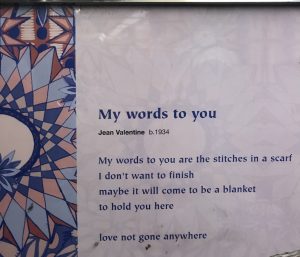Spoken word poetry is poetry that is written on paper and yet performed out loud for an audience. I for one would like to say that this type of poetry is one of my favorites. It allows you to emotionally connect to the poet while vividly seeing there body language. It is one of the most effective forms of poetry if you’re trying to get a message across to your audience. For instance, in the movie “Louder than a Bomb”, Nova Venerable presented this poem named Cody. In my opinion it was an emotional poem. She was explaining the struggles her little brother had to go through and how she pretty much raised him as her own kid. However, her body language was Positive when she would speak of him but when she spoke on her parents contribution you could tell her body language changed along with her tone showing this deep sense of sadness.
I myself have never been to a spoken word poetry performance. I would like to go to one and experience it lively because even while watching it I get into it. It’s a well developed passionate form of poetry in which I can say I enjoy better than poetry written on paper. In class, we actually read a spoken word it was Pedro Pietri’s “Puerto Rican Obituary” and you could just tell the difference from an average poem besides the length.




